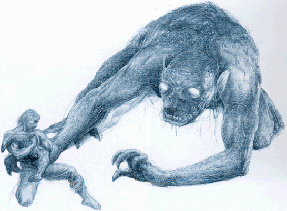“According to Gardner, art (and especially poetry) is the only thing that gives meaning to an otherwise meaningless universe. Language is the only way that humans can break through the wall that isolates them from other humans and from the world of meaning.”
Grendel sees language as a way of escaping his prison of loneliness. From the time he is born, Grendel has lived in a cave with his mother and in total linguistic isolation. However, as Grendel begins to venture out of the cave, he beings to mimic the humans and learn their language. Eventually, Grendel is able to talk to other beings in a language that he thinks is the same as the humans’, but nobody can understand them, thus deepening his feelings of aloneness and frustration. He is eternally trapped in a one-way communication, an interior monologue in which only he, himself, can understand his attempts at language.
After hearing the Shapers epic poetry, he wants to be a part of then, even if he has to be an evil character. So long as he is accepted, Grendel is willing to be the “bad guy,” referencing the ties between himself and Cain from the Old Testament. He is alone throughout Grendel and searches for ways to either be with the humans or part of their story. Slowly, through the progression of the story, Grendel acquires more language and understanding of language. He speaks from his consciousness and ties the story in a modern sense. Grendel experiments with different types of genres, eventually learning how to apply lines and verse to tell a story, similar to that of the story, Beowulf.

No comments:
Post a Comment